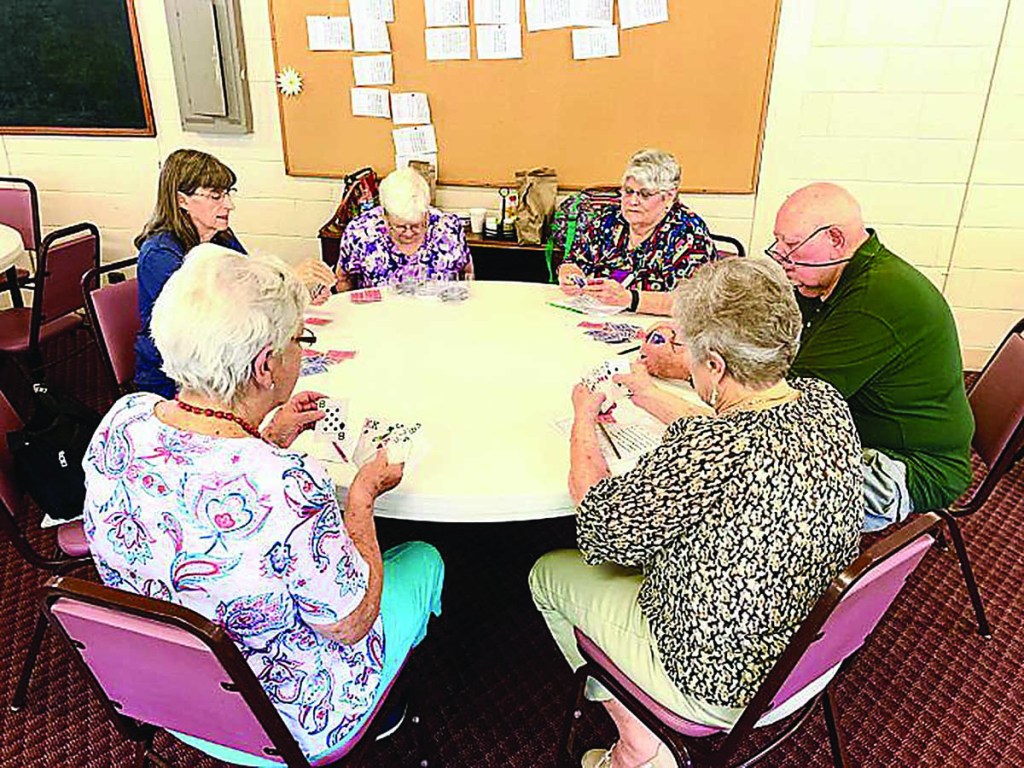Legislation aims to boost rural transit options for older Georgians
Published 7:30 pm Tuesday, August 27, 2019

- A group gets together for a card game last week at the Grantville Senior Center in Coweta County.
GRANTVILLE, Ga. — Shirley Brown was out three dollars when the public shuttle delivered her to the doctor’s office in Newnan too early for a recent appointment. Worried she’d get stuck there, Brown paid the bus fare to return to her house in Grantville and had a friend drive her back to the doctor later that day.
“I have enough trouble as it is,” Brown, 74, said last week from a domino table at the Grantville Senior Center about 45 miles southwest of Atlanta.
Advocates for older Georgians say legislation pending ahead of next year’s Georgia General Assembly offers a promise to make transportation less of a burden for thousands of rural seniors like Brown. Many no longer drive and must rely on family and friends and a patchwork network of public shuttles to get to important destinations like medical facilities and grocery stores. The need for better transit access has long existed for seniors in rural Georgia, advocates say, and new research says the need is growing as more of the state’s baby boomers age into their retirement years.
Travel challenges are common for Brown and other seniors who live in rural parts of Georgia. Her friend at the Grantville center, Wilma Brown, 84, occasionally cancels medical appointments when her son and his wife go camping and aren’t around to drive her places.
“Sometimes when you cancel, it’s hard to get another appointment,” Brown said last week. “Sometimes, I wish there were other ways to do it.”
A growing need
Georgia is home to about 200,000 residents 70 years and older who no longer drive and struggle to reach doctor appointments, grocery stores and other routine trips, according to a November report from the Georgia Health Policy Center. Many of those trips require crossing county lines when shuttles and transit services do not. That number does not include the nearly 27,000 people who use a state-run, non-emergency medical transportation program. And the older population is growing: The report estimates the number of people in Georgia 60 and older will double by 2040.
Unreliable transportation consistently ranks as the toughest challenge seniors cope with in rural parts of the state, said Vicki Johnson, the chairwoman for the Georgia Council on Aging. Combined with low incomes and chronic health problems, lacking a ride often causes many seniors in rural Georgia to miss dialysis treatments or other crucial appointments.
“We know this is a recurring need,” Johnson said. “When they can’t be certain to rely on transportation to get them there, that puts them in a very precarious position.”
Many seniors are determined to hang onto their car keys as long as they can. Charlie Rennpage, a retired electrician from Franklin who turns 90 next month, recently renewed his driver’s license for another eight years. He’s passionate about driving and likes to reminisce about long gone days when he would cruise U.S. Highway 101 outside Los Angeles in a top-down Oldsmobile convertible. Now he wonders what he would do if he could no longer get behind the wheel.
“If something should happen to me where I can’t drive, then I’m locked up here in Franklin,” Rennpage said at the Heard County Senior Center, not far from the Alabama border. “You’d hate to have to beg somebody to take you.”
Legislature mulling new transit agency
Johnson and other senior advocates hope state lawmakers pass legislation in next year’s General Assembly fixing Georgia’s disjointed transportation services to the benefit of rural seniors.
House Bill 511, sponsored by Rep. Kevin Tanner, R-Dawsonville, aims to consolidate transportation services now handled by several agencies into a new Department of Mobility and Innovation that would link low-income people, seniors and other underserved residents to new ride-share, shuttle and other small-scale transportation options. Those services are envisioned to cover clusters of neighboring counties designated as “mobility zones.” The new department would also give local governments money to build new transit projects that operate on a regional, multi-county basis.
“It creates opportunities for different solutions to be used in different parts of the state, and to have (more staff) on the ground listening to seniors’ individual needs and developing solutions,” Tanner said.
The Georgia Council on Aging and its grassroots arm, the Coalition of Advocates for Georgia’s Elderly, backed the bill earlier this month. House Speaker David Ralston, R-Blue Ridge, has also urged the bill’s passage, calling it “critical” to the state’s rural communities in an interview last week.
Rep. Terry England, chair of the state’s powerful House Appropriations Committee, is a co-sponsor of the transportation bill.
Pooling state transportation resources into multi-county mobility zones could help the state branch out to more than just Medicaid-funded transit services for seniors, said Johnson, the council’s chairwoman. It could also attract ride-share businesses like Uber to more rural areas where many seniors are expressing an interest in using them.
“If you can make better use of existing transportation providers by allowing them to provide rides as part of one program, then that might expand transportation opportunities in a cost-effective way,” Johnson said. “I think that would be a tremendous advantage.”
‘The whole world hurts’
Ride-share and other reservation-style options that pick people up at their homes or senior centers would most directly solve transportation problems for rural seniors, Johnson said. The Georgia Health Policy Center’s report also favors that on-demand approach over more traditional public bus services. Tanner’s bill includes provisions encouraging state transit officials to bring ride-share options to underserved areas.
But for now, transportation options remain limited for seniors like Doris Young. Just last week, the 75-year-old Grantville resident had to cancel a visit to her doctor in LaGrange because a friend who usually drives her there got sick. Young lives alone in a house her family has owned for more than 50 years and struggles with arthritis, a knee replacement and a bad back. Sometimes the pain in her knee is so bad “the whole world hurts.”
On a tight budget without a car, Young depends on the kindness of friends for rides to the doctor and a Meals on Wheels volunteer brings her groceries.
“If I didn’t have the friends I’ve got here,” she said, “I don’t know what I’d do.”





